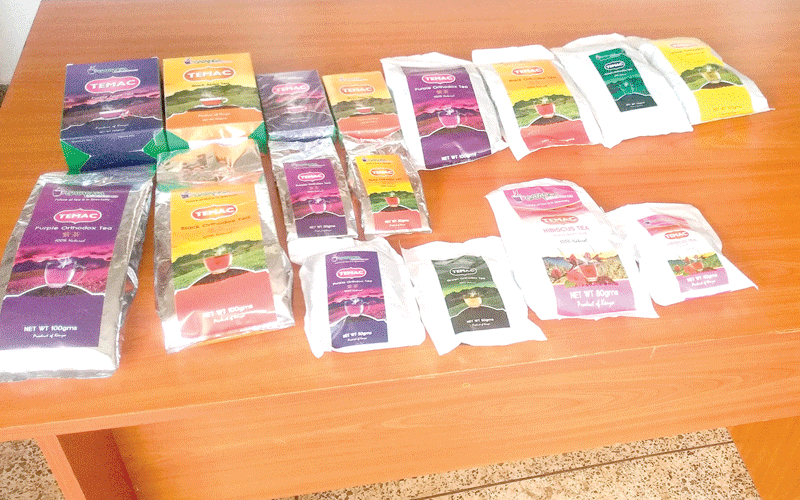Farmers switch to specialty teas in search of better prices

Small-scale farmers and local investors are shifting to production of specialised teas to benefit from premium prices in global niche markets as current earnings of black tea continue to decline.
More tea processors in the smallholder, multinational and independent categories have taken more deliberate efforts towards diversifying their tea processing to other teas including orthodox and green teas.
Agriculture and Food Authority (AFA) Interim Director General Anthony Mureithi said the radical shift in the tea sub-sector is demonstrated by the number of Black CTC processing factories seeking to be licensed to venture into processing other teas.
“This will see an increase in the production of Orthodox and green teas into the future, a commendable break from the Black CTC over-reliance,” he said in an interview.
According to Tea Directorate over 95 per cent of local tea is black tea produced using traditional methods of cut-tear–curl (CTC) which gives it a robust taste while orthodox is rolled.
The main markets for orthodox teas are Russia, Germany, US, Dubai, Taiwan, Turkey, Iran, Czech Republic, Kazakhstan and Canada.
Kenya black CTC tea is mainly used for blending lower quality teas from other countries, and only 14 per cent of the product is exported as value added and the remaining is sold in bulk form.
Speaking during a recent media tour of Gitugi Tea Factory in Nyeri county, Peter Muchiri, the company chairman, said to shield itself from price fluctuations, the firm has turned to enhancing tea diversification.
“Going forward we expect our farmers will not be disillusioned like this year following decline of the earnings,” he added.
Between 2007 and 2015, considerable fluctuations created uncertainty on the incomes of the farmers, especially, the smallholders who are less diversified in their production activities.
The low performance of the tea companies this year comes on the backdrop of a severe drop in CTC tea prices at the Mombasa Tea Auction from an average of $2.71 (Sh275.50) last financial year (2017-2018) to $ 2.34 (Sh237.88) in the 2018-2019 financial year, representing a 13.6 per cent drop.
Globally, tea prices at the other two key auction centres of Colombo in Sri Lanka and Kolkata in India likewise declined.
Colombo prices for orthodox teas declined from $3.99 (Sh405.62) to $ 3.26 (Sh331.41, representing 18.2 per cent the same period.
Kenya Institute for Public Policy Research and Analysis (Kippra) advises that the Tea Directorate should enhance cottage factories to raise the productive capacity in the country.
“There is need to reduce the acreage for licensing specialty tea factories from 250 hectares to cater for small-scale production.
The small-scale farmers also need to be encouraged, through incentives, to replace their existing black tea bushes,” it said in a policy brief.
Orthodox teas
Mureithi confirmed that so far the Tea Directorate has licensed 13 cottage industries to produce specialised teas for local consumption and export.
The directorate, he added, is in the process of licensing others who their licences are currently being scrutinised.
Gatanga Cottage Industries Ltd in Muranga county is one of the licenced manufacturers of specialised orthodox teas.
The company started manufacturing specialised teas in 2018 though it is yet to achieve its full production capacity of four tonnes as it only manufactures two tonnes per day. Elizabeth Njeri, the company factory manager in an interview at her Gatanga office said specialty teas compared local to black CTC fetch high prices both locally and internationally.
The company has planted 60 acres under purple tea and equally source the commodity from 69 contracted farmers from the locality. “We pay farmers Sh100 for a kilo of purple tea delivered to us every month.
Equally, we are very strict as we ensure standards are maintained and if not we reject some deliveries that do not meet the quality standards,” said Njeri.
Further purple tea contributes calcium and thus enables consumers to keep fit, rejuvenates brains and some companies are using it to manufacture lotions because of anti-aging properties.
“The purple tea market globally is lucrative and all of our manufactured products are exported to China and very soon we will enter new markets of US and Canada.
We process specialty orthodox teas – purple orthodox, black orthodox tea, green orthodox, yellow orthodox, oolong orthodox,white orthodox, tips normal, hairy and golden,” Njeri said.
However, consumption of purple locally is still low owing to lack of awareness among Kenyans and the fact that the government is yet to aggressively educate consumers about the same.












